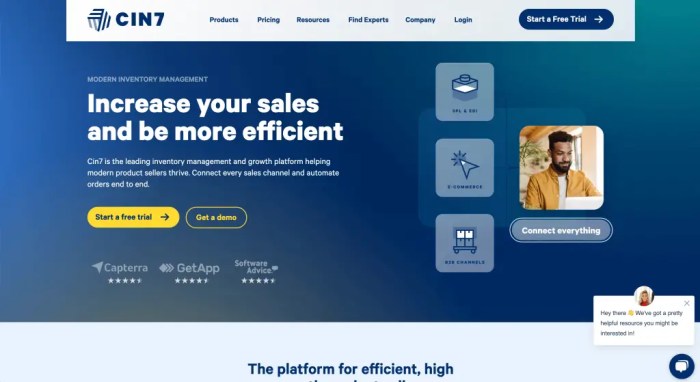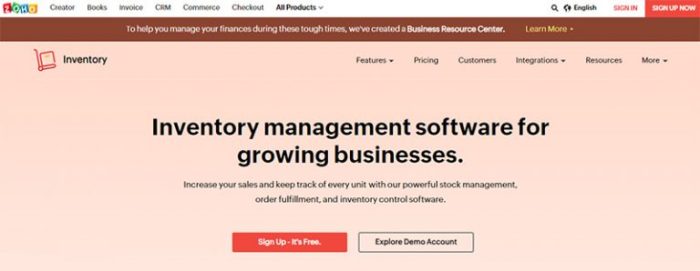Small business software for inventory and sales is revolutionizing how entrepreneurs manage their operations. This powerful tool streamlines processes, providing real-time visibility into inventory levels and sales figures. Accurate tracking empowers informed decision-making, leading to optimized stock levels and increased profitability.
By automating tasks such as order processing and inventory management, this software frees up valuable time and resources, allowing business owners to focus on growth and innovation. The ease of use and adaptability of these solutions make them ideal for businesses of all sizes, from startups to established companies.
Running a small business involves juggling numerous tasks, from managing inventory to processing sales. Efficient tools are crucial for success. This article explores the world of small business software specifically designed for inventory and sales management, highlighting key features, benefits, and considerations.
Understanding the Need for Inventory and Sales Software
Small businesses often struggle with manual inventory tracking and sales processing. Spreadsheet-based systems can quickly become unwieldy, leading to errors, lost sales opportunities, and inefficient operations. Dedicated software solutions streamline these processes, offering a more organized and accurate approach. This includes features like automated order fulfillment, real-time inventory updates, and insightful sales reports.
Key Features to Look For in Inventory Software
- Real-time Inventory Tracking: Accurate inventory levels are critical for avoiding stockouts and overstocking. Software should allow for automatic updates as items are sold or received.
- Automated Order Fulfillment: Streamlining the order process reduces errors and improves customer satisfaction. Look for features that automatically generate shipping labels, track order status, and notify customers.
- Sales Reporting and Analytics: Gain valuable insights into your sales performance with detailed reports on product sales, customer trends, and overall business performance. This data is vital for strategic decision-making.
- Customer Relationship Management (CRM): Integrated CRM features allow you to manage customer data, track interactions, and personalize communication. This can enhance customer loyalty and improve sales conversion rates.
- Integration with Accounting Software: Seamless integration with your accounting software is crucial for accurate financial reporting and streamlined data flow. This minimizes manual data entry and ensures consistency.
- Mobile Access: Many modern small business owners are on the go. Look for software with mobile apps for managing inventory and sales from anywhere, anytime.
Types of Small Business Inventory and Sales Software
Several different types of software cater to various needs and budgets. Choosing the right one depends on the specific requirements of your business. Some popular options include cloud-based solutions, desktop applications, and specialized point-of-sale (POS) systems.
Cloud-Based Inventory and Sales Software, Small business software for inventory and sales
Cloud-based software offers flexibility and scalability, allowing for easy access from multiple devices and locations. This is often a more affordable option compared to on-premise solutions, especially for smaller businesses.
Desktop Inventory and Sales Software
Desktop applications provide a more robust set of features, often tailored to specific industries. However, they can be more expensive and require more technical expertise to manage.
Point-of-Sale (POS) Systems
POS systems are specifically designed for handling sales transactions in retail environments. They offer features like inventory management, customer tracking, and payment processing, all in one integrated system.
Factors to Consider When Choosing Software
Choosing the right software is a crucial decision for your business. Consider factors like scalability, ease of use, customer support, and pricing.
Scalability and Future Needs
As your business grows, the software should adapt to your changing needs. Choose a solution that can accommodate future expansion and increased sales volume.

Source: smallbiztrends.com
Ease of Use and Training
Intuitive software is essential for efficient adoption and reduced training time. Consider user-friendliness and available training resources.
Customer Support and Resources
Excellent customer support is crucial for resolving issues and ensuring smooth operation. Look for software providers with responsive and helpful support teams.
Pricing and Cost-Effectiveness
Evaluate the pricing models and ensure the software aligns with your budget. Consider hidden costs and long-term expenses.
Frequently Asked Questions (FAQ)
- Q: How much does small business inventory and sales software cost?
A: Pricing varies significantly depending on the features, vendor, and the specific needs of your business. Some solutions are subscription-based, while others offer a one-time purchase. Contact vendors for specific pricing details. - Q: What is the best software for my type of business?
A: The best software depends on your specific business needs. Consider factors like your industry, inventory volume, sales volume, and budget. Research different solutions and evaluate their features. - Q: How long will it take to implement the software?
A: Implementation time varies depending on the complexity of the system and your team’s technical expertise. Plan for adequate time for setup, training, and data migration.
Conclusion
Implementing the right small business software for inventory and sales management is a significant step toward optimizing operations, boosting efficiency, and driving profitability. By carefully evaluating your needs, researching different options, and considering the factors Artikeld in this guide, you can select a solution that effectively supports your business growth.
Call to Action: Small Business Software For Inventory And Sales
Ready to streamline your inventory and sales processes? Explore our curated list of top-rated small business software solutions. Click here to learn more and find the perfect fit for your business today!
In conclusion, the right small business software for inventory and sales is a strategic investment that can significantly boost efficiency and profitability. Choosing the right solution can lead to a smoother workflow, improved customer satisfaction, and ultimately, a more successful business. The key is to carefully evaluate your needs and choose software that aligns with your specific requirements and budget.
Commonly Asked Questions
What are the typical costs associated with these software solutions?
Pricing varies significantly depending on the features offered, the number of users, and the chosen subscription model. Some providers offer free tiers or affordable monthly plans, while others have more comprehensive options with higher costs. It’s crucial to compare different packages and evaluate whether the added value justifies the investment.
How can I integrate this software with my existing accounting system?
Many inventory and sales software solutions are designed with seamless integration capabilities in mind. Look for features that allow for data transfer and synchronization between your accounting system and the inventory software to maintain accurate financial records. Check the software provider’s documentation for details on integration options.
What kind of customer support is typically offered?

Source: ownersmag.com
Customer support varies between providers. Some offer comprehensive support through phone, email, or live chat, while others rely on self-help resources. Research the support options and choose a solution that meets your support needs. Look for options that provide timely and effective resolution of issues.